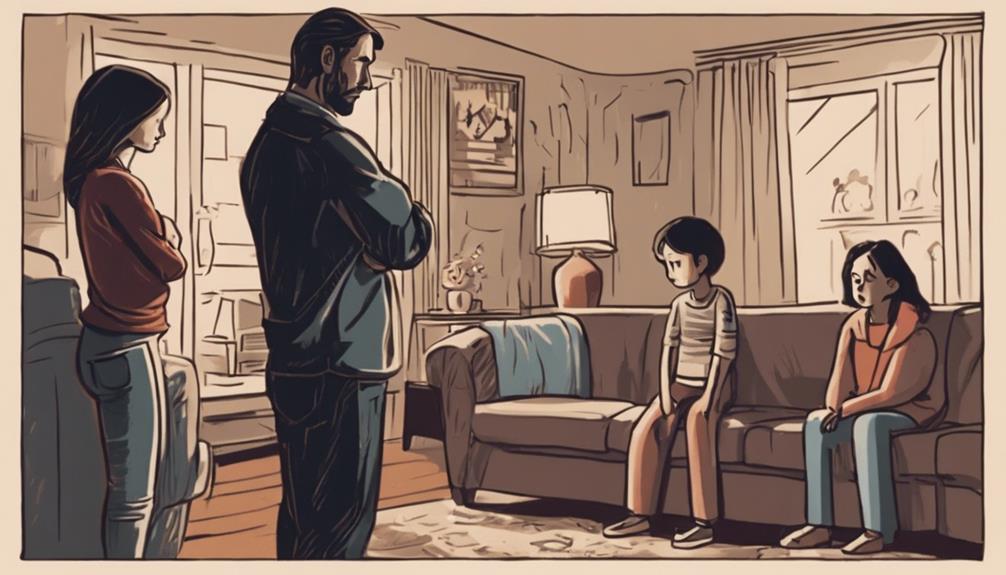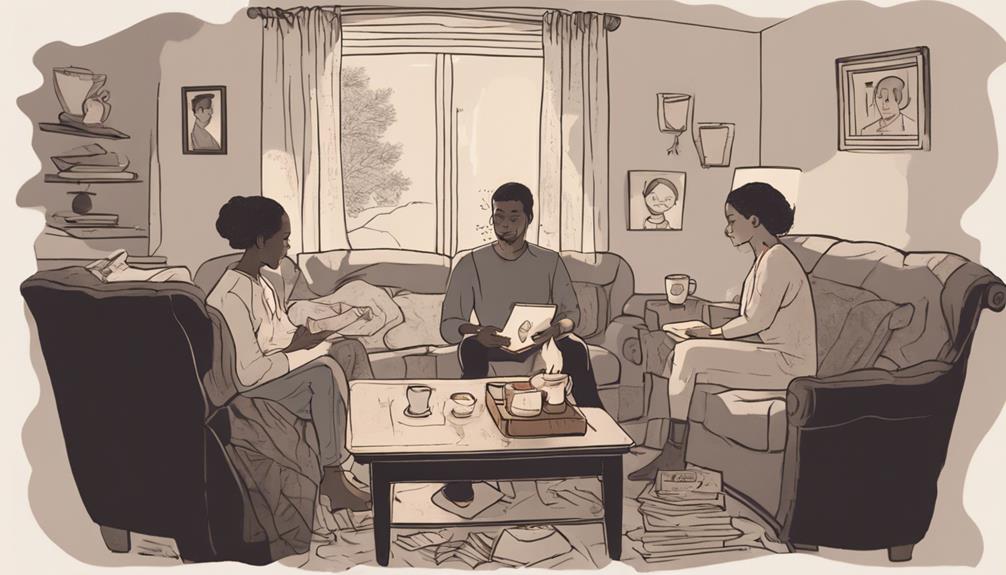When infidelity hits, it feels like a tornado ripping through your family. Trust breaks down, and emotions run deep. You might notice your loved ones struggling with confusion, anger, or sadness, which can ripple through the entire household. Kids often sense the tension and may change their behavior, adding more stress. It's essential to create safe spaces for everyone to express their feelings. Open communication will help rebuild connections and identify the underlying issues. As you navigate this turmoil, understanding the dynamics at play can guide you toward healing and restoration within your family unit. There's more to uncover about this journey.
Understanding Infidelity's Roots

Infidelity often stems from deeper emotional needs or unresolved issues, making it essential to explore both individual and relational dynamics to truly understand its roots.
You might find that the motivation factors behind infidelity often include unmet emotional needs, feelings of neglect, or a desire for validation. When partners fail to communicate openly, these feelings can fester, leading to a communication breakdown that creates distance and misunderstanding.
In many cases, individuals may seek connection outside their primary relationship as a misguided attempt to fill emotional voids. It's important to recognize that this doesn't excuse the behavior, but understanding these motivations can provide insight into the complexities of human relationships.
You may have experienced moments where a lack of honest dialogue led to feelings of isolation or frustration.
Emotional Consequences for Families
The emotional fallout from infidelity can ripple through families, often leaving lasting scars that affect not just the couple involved, but also children and extended family members. You might feel a whirlwind of emotions, from anger to betrayal, complicating your relationships with those around you.
The guilt management process can be particularly challenging; the betraying partner may struggle to cope with the shame while the betrayed partner grapples with feelings of inadequacy and hurt.
Children may sense the tension, feeling torn between parents or wondering if they're responsible for the discord. This can breed anxiety and confusion, leading to trust issues in their own relationships later in life. It's vital to acknowledge these feelings and create a safe space for open dialogue.
Trust rebuilding is a long and delicate journey, requiring patience, honesty, and consistent efforts from both partners. You'll need to navigate the complexities together, possibly seeking professional support to foster healing.
Shifting Family Roles and Responsibilities

Steering the aftermath of betrayal often shifts family roles and responsibilities, forcing everyone to reevaluate their positions within the household.
As trust crumbles, you may find yourself stepping into roles that were once held by your partner. This role reversal can be jarring but also an opportunity for growth. You might take on more emotional support duties, while your partner, grappling with their actions, may need to reassess their contributions.
Shared responsibilities become vital during this tumultuous time. It's important to communicate openly about who'll handle what, whether it's managing finances, household tasks, or emotional labor.
Establishing new boundaries and roles can foster a sense of stability amidst the chaos.
Children's Reactions and Impact
Children often react to the upheaval of infidelity with a mix of confusion, sadness, and anger, making it vital for parents to understand and address their feelings during this challenging time. Their child behavior may shift dramatically; you might notice increased irritability, withdrawal, or even attempts to mediate between parents. This emotional turmoil can manifest in various ways, from declining grades to acting out at school or home.
As a parent, it's important to create a safe space for your children to express their feelings. Acknowledging their pain without judgment helps them feel heard and valued. They may struggle to process the betrayal, feeling torn between loyalty to each parent. Encourage open dialogue, letting them know it's okay to be upset or confused.
It's essential to validate their emotions rather than dismissing them as mere childhood reactions. Your support can make a significant difference in how they cope with the situation. By being attuned to their needs, you can help them navigate this emotional minefield, fostering resilience and understanding in the face of family upheaval.
Coping Mechanisms for Family Members

Finding effective coping mechanisms is essential for all family members as they navigate the emotional fallout of infidelity, ensuring everyone has the tools to process their feelings and foster healing.
First, establish robust support networks. Surrounding yourself with understanding friends, family, or support groups can provide a safe space to express emotions and gain perspective. Remember, you're not alone in this.
Next, focus on communication strategies. Open and honest conversations are fundamental. Encourage each family member to share their thoughts and feelings without fear of judgment. Practicing active listening can help everyone feel heard and valued. Setting aside regular time to check in with one another can strengthen relationships and promote emotional well-being.
Additionally, consider individual coping mechanisms such as journaling, therapy, or engaging in physical activities. These techniques help individuals process their feelings and reduce stress.
Emphasizing self-care is imperative; prioritize activities that bring joy and relaxation.
Societal Perceptions and Stigma
Infidelity often carries heavy societal perceptions and stigma, making it challenging for families to navigate their healing journey without feeling judged or isolated.
You might find that cultural attitudes shape how people view infidelity, often leading to harsh moral judgments. These judgments can create a sense of shame, making it difficult for those affected to seek support.
When you're grappling with infidelity, the weight of societal expectations can feel overwhelming. Friends and family may not understand the complexities involved, leading to unsolicited advice or blame. This can exacerbate feelings of isolation and guilt, preventing honest conversations about the pain you're experiencing.
It's essential to recognize that these cultural attitudes don't define your family's worth or the potential for healing. You deserve compassion and understanding as you navigate this tumultuous period.
Acknowledging the stigma surrounding infidelity can help you reclaim your narrative, allowing you to focus on healing rather than societal perceptions.
Paths to Healing and Reconciliation

Healing and reconciliation after infidelity require intentional effort and open communication between partners, allowing both to express their feelings and rebuild trust. Start by acknowledging the hurt; it's essential for both of you to voice your emotions without fear of judgment. This creates a safe space important for healing.
Forgiveness strategies can vary, but they often involve understanding the underlying reasons for the infidelity. You might find it helpful to discuss what led to this breach and how it made you both feel. Active listening plays a significant role here; truly hear each other's perspectives.
As you navigate this process, focus on rebuilding trust. This means setting clear boundaries and being consistent in your actions. Transparency is key—sharing daily experiences can foster a sense of connection and security. It's important to remember that trust isn't rebuilt overnight, so be patient with yourselves.
Consider seeking professional help, like couples therapy, to guide you through this challenging terrain. With commitment and compassion, you can emerge from this stronger, finding a renewed sense of intimacy and partnership. Healing is possible, and both of you deserve it.
Conclusion
Infidelity shakes the foundation of families, but it doesn't have to signal the end. You can navigate the emotional turmoil by understanding its roots and recognizing the impact on everyone involved.
By fostering open communication and embracing coping strategies, healing is possible. Remember, it's okay to seek support and take time to process.
With patience and commitment, families can find new paths to reconciliation, ultimately emerging stronger and more connected than before.
